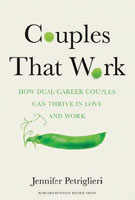How Dual-Career Couples Make It Work
By Jennifer Petriglieri
 The majority of professionals today are members of dual-career couples in which both partners are highly educated and work full-time in demanding jobs. Evidence is mounting that when both partners work they enjoy a raft of benefits such as a lower-than-average chance of divorce, more economic freedom, and the ability to take greater career risks. They also face a set of unique challenges. How to decide whose work travel takes priority? How to share family commitments? And how to manage the envy that can emerge when one partner’s career is more successful than the other’s? When both members of a dual-career couple are in senior leadership roles, these challenges are intense, and how couples face them has consequences for their teams and organizations as well as for themselves and their families.
The majority of professionals today are members of dual-career couples in which both partners are highly educated and work full-time in demanding jobs. Evidence is mounting that when both partners work they enjoy a raft of benefits such as a lower-than-average chance of divorce, more economic freedom, and the ability to take greater career risks. They also face a set of unique challenges. How to decide whose work travel takes priority? How to share family commitments? And how to manage the envy that can emerge when one partner’s career is more successful than the other’s? When both members of a dual-career couple are in senior leadership roles, these challenges are intense, and how couples face them has consequences for their teams and organizations as well as for themselves and their families.
In Couples That Work: How Dual-Career Couples Can Thrive In Love and Work, I distil more than five years of research on dual-career couples across the globe. I identify three key phases of exploration and personal growth in every couple’s work-life journey, showing how partners must navigate these together to strengthen their bond. I found what makes the difference between couples that thrive and those who struggle is: They are not afraid of deeper conversations, they build couple contracts, and they don’t let outside influences sway their personal priorities and values.
EMBRACE DEEPER CONVERSATIONS
Members of dual-career couples are smart go-getters and when they face a challenge, they naturally search for logistical solutions. While understandable, this focus prolongs their struggle because it ignores the underlying psychological forces — such as their struggles for power and control and their personal hopes and fears — that create their challenges in the first place. Couples make their relationship work when they begin to face, to discuss openly, and to choose deliberately what they want their life together to be about and who they want to become.
BUILD A COUPLE CONTRACT
Couples rarely unravel because they don’t support each other. They unravel because they are not sure exactly what they are supporting and why. When couples build a psychological contract, they make a commitment to a set of shared values, to some boundaries neither will cross, and to a model of how their careers will fit together. This contract makes it easier to face challenges because they know what a good life means for them, what they need and want, and therefore what they can let go of and what they must keep pursuing, even at a cost.
IGNORE OUTSIDE INFLUENCES
 One of the most surprising (and comforting) findings of my research is that there are no one-size-fits-all solutions for dual-career couples. Couples can thrive when one of them takes a lead and the other a secondary career, when both have careers that require huge time investments, and when they take turns pushing forward their careers and supporting at home. Couples that work choose priorities that they personally value and stick to them, regardless of whether or not others value the same. Conversely, couples struggle when they become beholden to cultural ideals of what a “good” couple should do.
One of the most surprising (and comforting) findings of my research is that there are no one-size-fits-all solutions for dual-career couples. Couples can thrive when one of them takes a lead and the other a secondary career, when both have careers that require huge time investments, and when they take turns pushing forward their careers and supporting at home. Couples that work choose priorities that they personally value and stick to them, regardless of whether or not others value the same. Conversely, couples struggle when they become beholden to cultural ideals of what a “good” couple should do.
JENNIFER PETRIGLIERI is an associate professor at INSEAD and the author of Couples That Work: How Dual-Career Couples Can Thrive in Love and Work.
